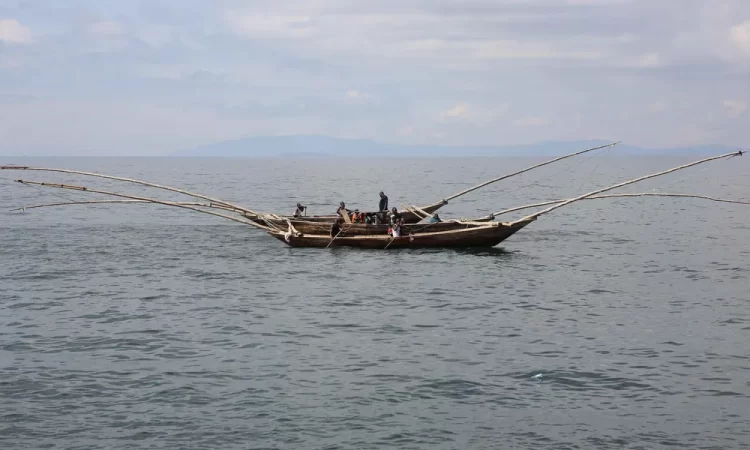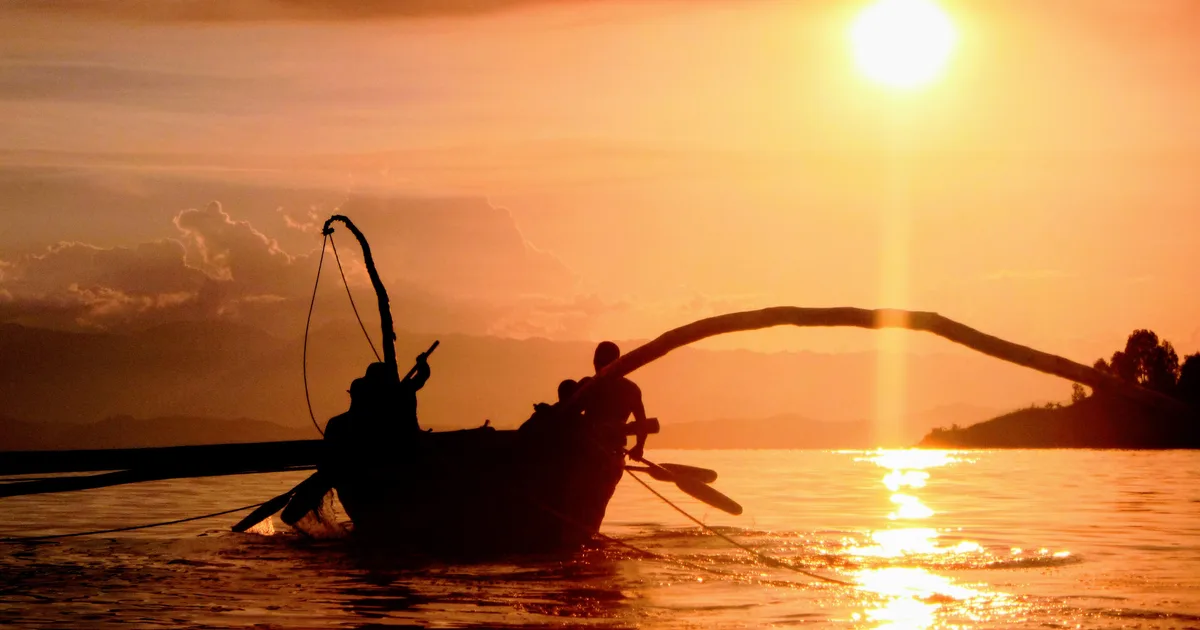Experience Lake Kivu’s Singing Fishermen: The fishermen’s experience on Lake Kivu is a newly introduced tourism activity on the lake’s banks that has begun to draw a large number of tourists to Rubavu/Gisenyi, where fishing is done in three-wheel canoe boats.

It is becoming a component of tourists on a Rwanda gorilla safari tours to spend the night in Gisenyi after doing gorilla trekking in Volcanoes National Park or Nyungwe National Park and staying in Rubavu / Gisenyi. You may add color to your evening with this amazing, real fishing experience on Lake Kivu.
This may simply be encrypted using your Rwanda Safari travel package. A strong suggestion for anybody interested in learning more about Rwanda outside the tourist spots. The fishermen’s experience is as real and enlightening as you could hope for.
Experience Lake Kivu’s Singing Fishermen.
As evening approaches, hundreds of unusual three-hulled fishing boats leave communities all along Rwanda’s coastline. With characteristic long poles connected to their bows and sterns, these beautiful boats gradually silhouette against the darker sky. In tiny groups, they seek deep water a few miles out into the lake, where they cast their nets and fish all night.
To view them leave at dusk, visit a hotel in Bralirwa which is about 7km from Gisenyi, Kibuye’s inlets, or coastal communities like Cyimbili or Kinunu. Listen closely. Sails are not employed in the quiet evening since there is no wind. Instead, each team of fisherman paddles out with incredible agility and speed because, working together, they chant rhythmically to synchronize their paddle strokes and encourage one another.
Viewing from the shoreline, this is an intriguing sight. However, why not go out on the lake and be right beside them? Silently paddling out onto Lake Kivu by kayak is by far the greatest way to view the fishing boats and hear their workers, as well as capture the sunset. Because only on the water can you go up close to the fisherman, watch them paddle, and truly enjoy their song.
When night falls, the fishing boats come in place. They turn on lamps to lure a species of little sardine (known as Isambaza) and the tasty, bigger Tilapia that they capture in their nets. Lake Kivu quickly takes on the appearance of a starry sky, thanks to the lights from the numerous fishing boats scattered throughout the water. It seems both charming and impressive from one of the luxury lodges, guesthouses, or even a private island camping that dot its coastline.
Nevertheless, for the fisherman out on the ocean, their job is difficult. Their catches are small due to Lake Kivu’s peculiar physical qualities, which limit the number of fish it can host. As a result, while they labor the most of the year, they all take a few days off each month (around the full moon) and in September and October to allow the fish to replenish their numbers.
Kayaking on Lake Kivu has become one of the most popular pastimes in Gisenyi and Kibuye, thanks in part to the sight of fishing boats departing for the night. So, plan your vacation carefully and, in addition to a fantastic time on the water, you’ll be rewarded with an unforgettable experience unlike any other in Rwanda.
The photographs made throughout the fishermen’s expedition on Lake Kivu are pristine and among the best in the country. The entire experience is real, with local fisherman, both Congolese and Rwandese on a combined fishing trip, going about their daily business without being influenced or tempered by the presence of tourists. You will love their traditional folk songs, which they sing while fishing as they cast their nets into the water in search of a catch.
When is the best time to experience the Singing Fishermen on Lake Kivu?
Each evening, one of Rwanda’s most idyllic activities takes place on the beaches of Lake Kivu. As the sun sets, lakeside villages come alive with the chants and whistles of fisherman making their way to the lake’s center, preparing for another night of labor.

By 4.30 p.m., tourists who want to join the fishermen on their adventure should be ready by the lake’s shores to witness the entire process, beginning with the fishermen assembling their fishing gear, which includes three boats, nets, and lamps, as they team up to start off and head into the lake.
You should have reserved a private boat cruise with a guide who will function as a translator and assist you during the fishing procedure, explaining what happens.
The workday begins with hundreds of fisherman rowing to the center of the lake, chanting and whistling in time. They sing for bravery and to assist them paddle their boats as they become lost in the lake while hunting.
How long does the experience on Lake Kivu take?
The fishermen’s nightly journey across the lake, with their melodic songs (which is why they are known as the singing fishermen of Lake Kivu) and brightly lit lanterns, is truly captivating, and it can last all night, from around 5 p.m. in the evening until 5 a.m. the next morning, as they try to catch a fish.
Visitors who want to experience this will join them about 4 p.m. to see them begin preparations until they follow them up on a different boat, but they may also later join the fishermen on their three-boat canoe to check out the fishing expedition. When it gets dark, around 6:30 p.m., the fishermen begin to light their gas lights, attracting the fish to their nets. This creates a wonderful lighting effect on the lake, similar to dinner date candles.
The inhabitants around Lake Kivu are well-known for their lights. The brilliant fishing lights make the lake look very colorful at night. Finally, after several hours of waiting, the fisherman lifts the net, which they will do up to three times throughout the night before returning to shore.
Visitors can return to their hotels between 8 and 9 p.m., once the nets have been put into the seas. The complete event can last between 2 and 4 hours, depending on one’s interest. Watching from the lake’s banks seems appealing; why not walk out there and enjoy a moment with them? Because only by observing will you be able to engage with them and observe every beat of the encounter.


